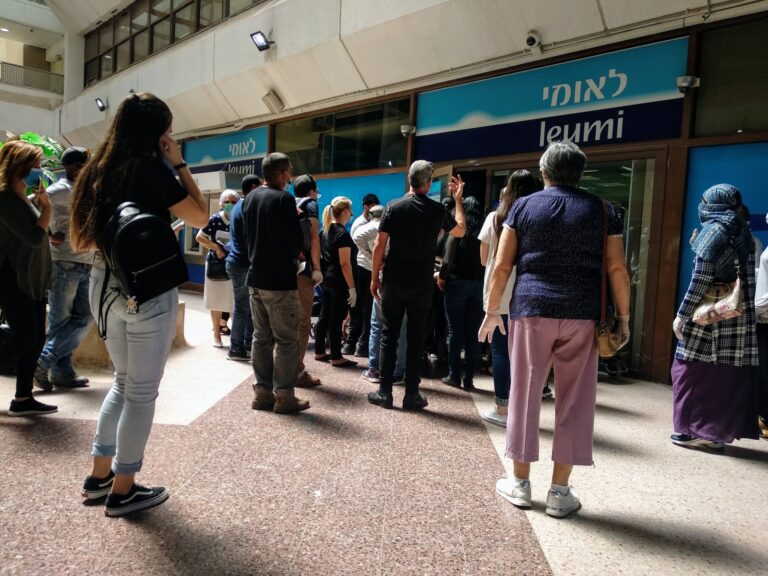Don’t expect it to be vertical, quick or quiet. Do expect to make new best friends.
The concept of standing in line is (how should we put it?) massively underdeveloped here in Israel. What you identify as a line – people standing quietly at a respectful distance apart, vertically, everyone awaiting their turn – simply does not exist in the Holy Land.
To help you survive the unique phenomenon that is standing in line here, we’ve outlined the basic do’s and don’ts that you really must be familiar with. These rules may strike you as humorous, and they are, but ignore them at your own peril.
Don’t expect it to be vertical

The most basic assumption about a line – whether in front of an entrance to a museum, bus, bathroom, office, whatever – is that people form it in a vertical fashion. Not here.
Here, we prefer more of a mosh pit – a roving shape with unclear borders that ebbs and flows according to an intrinsic rhythm. Israelis, by the way, will be perfectly capable of telling you where it starts and ends, and who exactly cut the line.
Do expect people to cut the line
Speaking of which, cutting the line is a national sport. There are myriads of excuses for it, the ultimate one being, “I just have a question” (so do we, lady, so do we). Some particularly annoying people don’t even bother making up a reason for their horrible behavior, casually slotting themselves ahead of their natural place and acting as if they’ve always been there.
It is worth pointing out, however, that some people are actually allowed to jump ahead. Elderly people, for instance, or pregnant women. Some people with disabilities (visible or non-visible) have a special card permitting them to always go to the front of the line, so please refrain from shaming anyone about it.
Don’t expect people to respect your personal space

You would have thought that Covid would have taught us the art of social distancing. At the height of the global pandemic there was a half-hearted attempt to do that in Israeli public spaces, but we have reverted to our usual physical inability to stay at a respectful distance from others.
This is a particularly annoying phenomenon in summer, when you are hot and sweaty and most certainly do not want other hot and sweaty people touching you. Good luck with that.
Do expect to make friends

The upside of the above point is that you’re very likely to emerge from the line with new friends. Conversation usually originates around the topic of how unbearable this line is, how rude others are, etc., and then progresses to where you’re from, whether you’re married, how many kids you have and a myriad of other personal questions that elsewhere in the world would be considered taboo for discussion. Feel free to ask your new BFF equally intrusive questions, or try to keep the conversation as short as possible. From personal experience, the former is the more convenient way to pass the time.
Don’t expect it to be quiet
Abroad, people are often cognizant of the fact that they’re stuck with others in tight surroundings and keep their voices down, refrain from lengthy phone conversations or just make sure that their earphones are tightly screwed in. Not in Israel.
Here, you can expect to discover people’s most intimate life details conveyed to their families and friends on the phone (and quite possibly also hear the other end of the conversation; we like our phone volume loud), their favorite music (blasted from their phone on speaker) and their unsolicited political opinions, given out to their unfortunate line neighbors.
Do bring a bottle of water
The combination of a lengthy line and extreme heat is one of the worst known to mankind, and nothing makes you as thirsty as waiting for someone to get a move on. A bottle of water is therefore a must, preferably a nice cold one. We also recommend that you have with you a coffee and a snack, just to be on the safe side. But please, don’t munch on anything with too strong a smell – that’s just being unkind to others.
Don’t expect it to go quickly

This one pretty much goes without saying, but lines do not go quickly here. How could they? Between their disorganized form, people’s rising level of angst and that one person who finds it imperative to get into a heated argument with the service provider, it just takes hours. We suggest you take a deep breath, view the whole thing in an anthropological light and remember that this too shall end.
Do expect a lot of complaints
The most popular way to pass the time while standing in line here is complaining. And while we’re all for venting our feelings, it’s worth bearing in mind that everyone else is super annoyed too and that, no, you are not receiving especially bad service aimed personally at you. As for other people’s complaints, don’t bother trying to convince them that they’re wrong or that there’s nothing to complain about – nodding along is just so much easier.
Don’t expect patience once you reach the front of the line
You’ve stood in line for hours, suffered from all the above difficulties, and finally made it to the front of the line, only to be met with a worn-out, often cross person giving you service. Don’t take out your pent-up frustration on these poor folks, nor expect them to be incredibly patient with you. After all, they’ve been working this whole time, dealing with incredibly annoying people. Keep your exchange as quick and as civil as possible, and then promptly make way for the hundreds of people behind you.
Do expect a sense of accomplishment
Having survived the horrid line and hopefully gotten what you stood there for days for, you’ll no doubt be feeling a massive sense of accomplishment, even small victory.
This will inevitably lead to telling your friends smugly all about your heroic endeavor, only for them to tell you with even greater exaggeration the pain they went through that day on another line.
Then, you will realize that there is nothing more boring than listening to people recounting their standing-in-line tales. But as we learned in No. 8, nodding along is just so much easier.
